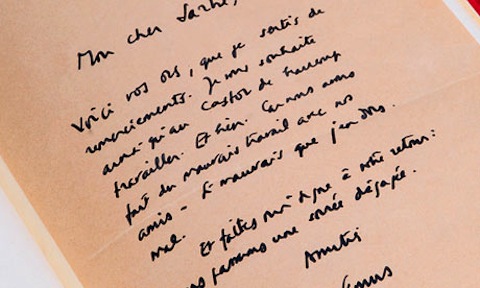
As maître of the mid-century French philosophical scene, Jean-Paul Sartre wielded some considerable influence in his home country and abroad. His celebrity did not prevent him from working under the editorship of his friend and fellow novelist, Albert Camus, however. Camus, the younger of the two and the more restless and unsettled, edited the French resistance newspaper Combat; Sartre wrote for the paper, and even served as its postwar correspondent in New York (where he met Herbert Hoover) in 1945. According to Simone de Beauvoir, the two became acquainted two years earlier at a production of Sartre’s The Flies. They were already mutual admirers from afar, Camus having reviewed Sartre’s work and Sartre having written glowingly of Camus’ The Stranger. Ronald Aronson, a scholar and biographer of the philosophers’ relationship, describes their first meeting below, quoting from de Beauvoir’s memoir The Prime of Life:
“[A] dark-skinned young man came up and introduced himself: it was Albert Camus.” His novel The Stranger, published a year earlier, was a literary sensation, and his philosophical essay The Myth of Sisyphus had appeared six months previously. [Camus] wanted to meet the increasingly well-known novelist and philosopher—and now playwright—whose fiction he had reviewed years earlier and who had just published a long article on Camus’s own books. It was a brief encounter. “I’m Camus,” he said. Sartre immediately “found him a most likeable personality.”
As the recently discovered letter above shows—from Camus to Sartre—the two were intimate friends as well as collaborators. Thought to have been written sometime between 1943 and 1948, the letter is familiar and candid. Camus opens with “My dear Sartre, I hope you and Castor [“the beaver,” Sartre’s nickname for de Beauvoir] are working a lot… let me know when you return and we will have a relaxed evening.” Aronson comments that the letter “shows that despite what some writers have said, Sartre and Camus had a close friendship.”
Aronson’s comment is understated. The querulous falling out of Sartre and Camus has acquired almost legendary status, with the two sometimes standing in for two divergent paths of French post-war philosophy. Where Sartre gravitated toward orthodox Marxism, and aligned his views with Stalin’s even in the face of the Soviet camps, Camus repudiated revolutionary violence and valorized the tragic struggle of the individual in 1951’s The Rebel, the work that allegedly incited their philosophical split. Andy Martin at the New York Times’ “The Stone” blog writes a concise summary of their intellectual and temperamental differences:
While Sartre after the war was more than ever a self-professed “writing machine,” Camus was increasingly graphophobic, haunted by a “disgust for all forms of public expression.” Sartre’s philosophy becomes sociological and structuralist in its binary emphasis. Camus, all alone, in the night, between continents, far away from everything, is already less the solemn “moralist” of legend (“the Saint,” Sartre called him), more a (pre-)post-structuralist in his greater concern and anxiety about language, his emphasis on difference and refusal to articulate a clear-cut theory: “I am too young to have a system,” he told one audience [in New York].
While Camus’ political disengagement and critique of Communist praxis in The Rebel may have precipitated the increasingly fractious relationship between the two men, there may have also been a personal disagreement over a mutual love interest named Wanda Kosakiewicz, whom both men pursued long before their split over ideas. Martin also tells that story—one perhaps more interesting in a dramatic sense than the abstract summary above—at The Telegraph. The short documentary clip below also dramatizes their disagreement with interviews, rare photos, newsreel footage, and readings from The Rebel. There is no mention, however, of Wanda.
Related Content:
Albert Camus Talks About Adapting Dostoyevsky for the Theatre, 1959
Simone de Beauvoir Explains “Why I’m a Feminist” in a Rare TV Interview (1975)
Free Online Courses in Philosophy from Great Universities
Josh Jones is a writer and musician based in Durham, NC. Follow him at @jdmagness


Leave a Reply